- Home
- Charlaine Harris
(LB1) Shakespeare's Champion Page 3
(LB1) Shakespeare's Champion Read online
Page 3
“Example.”
“Like if I was doing forty-fives, and that was my top capability or close to it, I’d lie down on the bench holding the dumbbells, and the spotter would stand or kneel at my head, and when I was pushing the weights up, if my arms started to shake, the spotter would grab my wrists and help me keep them steady.”
“Forty-fives?”
“Two forty-five-pound dumbbells. Some people lift using the bar and adding weights, some people use different-weighted dumbbells. I happen to prefer dumbbells. Del liked the bar. He thought he got better chest development.”
Claude looked at me thoughtfully. “You’re telling me you can lift ninety pounds with your hands?”
“No,” I said, surprised.
Claude looked relieved.
“I can lift a hundred ten or a hundred twenty.”
“You.”
“Sure.”
“Isn’t that a lot? For a woman?”
“In Shakespeare it is,” I said. “At one of the bigger city gyms, probably not, You’d have a bigger pool of weight trainers.”
“So how much would a man serious about training be able to do?”
“A man about Del’s build, under six feet, about one hundred seventy? After intense training, I guess he’d be able to lift maybe three hundred twenty pounds, more or less. So you can see strength wasn’t Del’s sole goal, though he was very strong. He wanted exceptional muscular development, for the look of it. I just like to be strong.”
“Hmmm.” Claude thought about the difference. “So you knew Del?”
“Sure. I saw him almost every morning at Body Time. We weren’t particularly friendly.” I was wiping off the table, since I had to go to work in ten minutes.
“Why not?”
I thought about it while I rinsed out the dishrag. I wrung it and folded it neatly and draped it over the divider between my sinks. I stepped across the hall to the bathroom, washed my hands and face, and slapped on a little makeup for my self-respect. Claude leaned against the kitchen doorframe to watch. He was waiting for an answer.
“Just…nothing in common. He was from here, had lots of family, dated a hometown girl. He didn’t like blacks, he didn’t like the Notre Dame football team, he didn’t like big words.” That was as close as I could come to explaining.
“You think enjoying living in a small town is wrong?”
I hadn’t meant this to be an analysis of my worldview.
“No, not at all. Del was a good guy in some ways.” I looked at my face, put on some lipstick, shrugged at my reflection. Makeup didn’t change the face underneath it, but somehow I always felt better when I’d used it. I washed my hands and turned to look at Claude. “He was harmless.” Right away I wondered what I meant. But I was too taken aback by the expression on Claude’s face to think it through right then.
Claude said, “I’ll tell you something strange, Lily. There weren’t any fingerprints on that bar where there should have been. There should have been lots, where a man would normally grip the bar. Del’s should have been on top. But there weren’t any. There were just smears. And you know what, Lily? I don’t think you’d put on your makeup in front of me if you had any serious interest in me.”
He stopped at the front door to deliver his parting shot. “And, I’d like to know, if Del Packard was in the gym by himself, how he turned out the lights after he died.”
IT WAS A day that had started out worst and moved up to merely rotten.
I was cleaning in a spirit of anger, and the results were not harmonious. I dropped papers, got paper cuts when I picked them up, slammed the toilet lid down so hard that a box of Kleenex plummeted from a flimsy rattan shelf in the travel agent’s bathroom, vacuumed up a few pushpins at the base of the bulletin board, and developed a full-blown hatred for the poster of a couple on the deck of a cruise ship because they looked so simple. They looked like they could say, “Gee, we really get along well. Let’s go to bed together!” and it would actually work.
I was glad this was my last job of the day. I locked the door behind me with a sigh of relief.
On my way home, I detoured to Marshall’s dumpy rented house. He’d offered me a key when we began “seeing” each other, but I had refused. So he had to stagger to the door to let me in, and stagger right back to the ancient plaid couch he’d scrounged from a friend when he’d separated from his wife. I put his Body Time key ring on the equally dilapidated coffee table, and went to sit on the floor near him. Marshall was sprawled full length and obviously felt lousy. But he wasn’t groaning, and his fever was down, I thought as I touched his forehead.
“Can you eat yet?” I asked, not knowing what else I could do for him.
“Maybe some toast,” he said in a pitiful voice that sounded very odd issuing from his extremely muscular throat. Marshall is one-quarter Chinese. He has skin that’s just between pink and ivory, and his eyes and hair are dark. His eyes have a bit of a slant, just a hint. Other than that, he’s Caucasian, but since he’s a martial arts teacher he enjoys emphasizing the Oriental fraction of his heritage.
“Please,” he added, even more pitifully, and I laughed.
“Mean,” he said.
I got up and found his whole-wheat bread and waved a butter knife over it, toasted it dry, and brought it to him with some water.
He sat up and ate every crumb.
“You’re going to live.” I took the plate from him and carried it to the sink. I would coddle him to the extent of loading his dishwasher, I decided.
Afterward I returned to sit by the couch. He’d slid down to his original position. He took my hand.
“I guess I will live,” he admitted, “though for a few hours I didn’t want to. And finding out about Del, God! Who would have thought Del would be dumb enough to drop a weight on his neck?”
“I don’t think he did.” I told Marshall about the lack of fingerprints on the bar, about the lights that should have been on.
“You think the spotter dropped the bar on Del by accident and then panicked?”
I shrugged.
“Hey, you don’t think someone killed Del on purpose? Who would do that?”
“I’m not a doctor, so I don’t know if this is possible…but if you felt a crushing weight on your neck and you knew you would die if it stayed there, and you were a grown healthy man, wouldn’t you fight to heave it off?”
“If I wasn’t killed instantly, I’d try as hard as I could,” Marshall said grimly. “If you’re saying someone held the bar down, who would be cruel enough to do that?”
I shrugged again. In my opinion, any number of people had that capacity for cruelty, even if they hadn’t discovered it in themselves yet, and I told Marshall that. I just couldn’t understand why anyone would indulge that cruelty by killing harmless, thick-headed Del Packard.
“You’re cold sometimes, you know?” Marshall had said that more than once lately. I looked at him sharply. This cold woman had gotten her butt out at six in the morning to open his business.
He went on. “Maybe Del was seeing someone else’s wife—that got Len Elgin killed—or maybe Lindy got mad at his training so much.”
“Del was too self-involved to go to the trouble of sneaking around,” I said. “And if you think Lindy Roland can lift fifty pounds, let alone close to three hundred, you better find another job.”
“That’s right, the one who dropped the weight had to be able to lift it first,” Marshall said thoughtfully. “Who do we know that can lift that much?”
“Almost anyone we know that works out regularly could lift that. Especially the men. Maybe I could, if I had to.” But I said the last part doubtfully. It would take a mighty surge of adrenaline.
“Yeah, but you wouldn’t kill Del.”
I could kill a man—I had killed a man—but I didn’t think I could do it unprovoked. I began mentally reviewing the list of regular weight lifters at Body Time.
“I can think of at least twelve and I’ve only been trying for a m
inute or two,” I said.
“Me, too,” Marshall said, and sighed. “Aside from feeling sorry for Del and his folks and Lindy, this isn’t going to be good for business.”
“Who’s cleaning up the mess?” I asked.
“Would you…”
“No.”
“Maybe the cleaning service from Montrose?”
“Phone them,” I said.
He looked at me accusingly. “You’re being cold about this.”
I felt a surge of irritation. There was that accusation again.
Marshall wanted me to yoke myself with him and his interests as though we were a permanent couple.
I wasn’t willing.
I shifted my shoulders under my T-shirt, rolling the muscles in an effort to relax. I reminded myself once again that Marshall was ill. I slid my hand from his.
“Marshall,” I said, keeping my voice quiet and even, “if you wanted warm-fuzzy you came to the wrong woman.”
He laid his head back against his pillow and laughed. I made myself think of his having thrown up all night and some of the morning. I made myself remember an especially good time we’d had in that bed I could glimpse through his open bedroom door. There were several to choose from.
He’d been my sensei, my karate teacher, for four years now. We’d become friends. Then Marshall had left his terror of a wife, Thea. After that we’d shared a bed from time to time, and some good hours of companionship. Marshall was capable of moments of great compassion and sensitivity.
But as our relationship progressed, I’d discovered Marshall expected me to change, and swiftly; expected all my edges to be rounded off by that lust, companionship, compassion, and sensitivity…all my peculiarities to be solved by the fact that I had a steady guy.
Since having a steady guy, having Marshall, was nice in many ways, I found myself wishing it worked that way. But it didn’t.
As I said a brief good-bye and left for home, I felt gloomy and restless. I’d rebuffed Claude, who was a proud man; now I was considering parting from Marshall. I couldn’t read my own signals, but I could tell it was time for a change.
DURING THE WEEK after Del Packard’s death, my life went according to routine once more.
I didn’t catch the flu.
A woman who specialized in cleaning up crime scenes drove to the gym from Little Rock. She expunged the mess Del’s passing had left. The gym reopened and Marshall resumed running it and teaching karate. He rearranged the workout equipment and mixed the bench Del had died on in with the others, so no one could say it was haunted, or try to reenact the crime.
I went to karate class, and I worked out. But I went to my home alone instead of to Marshall’s after karate, contrary to my recent practice. Though Marshall looked a little angry and a little hurt as I wished him a good evening, he also looked a little relieved. He didn’t ask me to explain myself, which was a pleasant surprise.
I didn’t see Claude Friedrich. It took me a couple of days to register that I wasn’t running into him and he wasn’t dropping in for lunch, and after that it took me a couple more to decide that this was by design, his design. I missed Claude’s company, but I didn’t miss the pressure of his desire.
And I lost clients. Tom and Jenny O’Hagen, who’d lived next door to me in the Shakespeare Garden Apartments, moved to Illinois to manage a larger Bippy’s. I wasn’t too concerned at the opening in my schedule. I had a standby list. I began calling. The first two potential clients fobbed me off with a lame excuse, and I could feel the worry start somewhere in my gut. Ever since the Burger Tycoon parking lot fight, I’d been concerned that my clientele would drop off.
The third family had found another maid, so I crossed them off. The woman who answered at the fourth number said she and her husband had decided to get divorced, and she would be doing her own cleaning. Another X. The fifth name on the list was Mookie Preston. After puzzling over the entry, I remembered that when Ms. Preston had called me a couple of months before, she’d said she’d just moved to Shakespeare. When I called her, she sounded delighted to hear that I could work for her on Friday mornings. She was renting a house, and she wanted longer than the hour and a half I’d given the O’Hagen apartment.
“Why don’t I work from ten to twelve on Fridays?” I was trying to imagine why a young single woman would need me for that long.
“We’ll see,” said the rich fruity voice. “I’m a little messy.”
I’d never laid eyes on Mookie Preston, but she sounded…eccentric. As long as her checks were good, I didn’t care if she raised catfish in the bathtub and wore a Barney the Dinosaur costume.
When I went to Body Time Thursday morning, I found Bobo sitting behind the counter to the left of the entrance. He looked as dispirited as an eighteen-year-old can look. I pitched my gym bag into an empty plastic cubicle, one of fifteen stacked against the east wall, after extracting my weight-lifting gloves. They were looking very shabby, and I knew I’d have to have a new pair soon; another item for my already tight budget. I began to pull them on, eyeing Bobo as I circled my wrists with the straps and Velcroed them tightly. Bobo stared back. He was even sitting depressed: shoulders sagging, hands idle on the counter, head sagging on his neck.
“What?” I asked.
“They’ve questioned me twice now, Lily,” he said.
“Why?”
“I guess the detective thinks I had something to do with Del getting killed.” He took a gulp of a repulsive-looking protein mixture that was the craze among the younger workout crowd. I wouldn’t have touched it with a ten-foot pole.
“How come?”
“Del worked for my dad.”
Among his many financial pies, Bobo’s father, Howell Winthrop, Jr., owned the local sports/exercise equipment/ marine supplies store. Del had worked there, mostly in the exercise equipment and exercise clothing department, though he’d had to know enough about hunting and fishing to sell all the other products Winthrop Sporting Goods carried. Del himself had told me all about it at excruciating length when I’d been buying my punching bag.
“So do a lot of people in town,” I observed.
Bobo looked at me blankly.
“Work for your dad.”
Bobo grinned. It was like the sun coming out from behind a cloud. He was really a lovely boy.
“Yeah, but Mr. Jinks seems to think that I decided Del knew something that would ruin Dad’s business, so either I thought of killing him or Dad told me to.”
“Because you were the last one to see him here?” Dedford Jinks is a detective on the little Shakespeare police force.
Bobo nodded. “Someone told the chief, who told Mr. Jinks, that when people didn’t bring their own spotters, they asked the staff to spot for them. Which, naturally, would be me.” He silently held out his plastic cup of goop. With a shudder, I shook my head.
I struggled with my guilt. It was I who had mentioned to Claude that sometimes a member of the staff was asked to fill in as spotter.
“I didn’t know Mr. Packard very well,” said the golden boy. “But really, I don’t think he could have found out anything illegal my dad was doing. This may not be respectful, especially now that Mr. Packard’s dead, but I never thought he was that smart, and if he knew something Dad was doing that was wrong, I think he’d just feel like he didn’t really understand. Or he’d go talk to Dad about it.”
I thought Bobo was exactly right.
“You look nice, Lily,” Bobo said, changing the subject so abruptly that it took a minute for his words to sink in.
“Oh. Thanks.” I was wearing a teal-colored T-shirt and sweatpants, new and unstained but strictly Wal-Mart.
“Why don’t you wear something like that?” Bobo pointed to the sportswear rack that Marshall kept stocked with expensive exercise clothing. The garment that had caught Bobo’s eye was pale pink and blue swirled in a tie-dye pattern, cut low over the boobs and high in the legs, meant to be worn over coordinating tights.
I snorted. “Righ
t.”
“You’d look pretty. You’ve got the body for it,” he said self-consciously. “I’d like to watch your back when you’re doing lat pull-downs.”
“Thank you,” I said stiffly. “But stuff like that just isn’t my style.”
I went over to say hello to Raphael. He’d recovered from his flu, but he had something on his mind. His greeting was not the usual happy roar.
“What?”
“You askin’ me what?” he said, rubbing the back of his head. Raphael kept his hair clipped so short that the passage of his mahogany hand made no change in the tight black curls. “I tell you what, Lily.” His voice got louder than it should have been, and I knew immediately that I had spoken to him at the wrong moment.
“You’re a good woman, Lily, but this place is not friendly to blacks.”
“Marshall—” I began. I was about to say Marshall was not a racist or some such thing, but I got interrupted.
“I know Marshall is not a bigot. But there are too many others here who are. I can’t come to a place where I’m not welcome as a black man.”
I’d never heard Raphael speak so seriously and angrily in the four years I’d known him. He was glaring at two men who were working out together on the other side of the room. They paused, stared at him for a minute, then went back to their activity. One of them was Darcy Orchard, a massively built man with long, thinning beige hair and acne-scarred cheeks, a broad Slavic face and legs like trees. I didn’t know the other man.
As I was trying to think what to say to Raphael, he just picked up his gym bag and walked out. I looked over at Darcy. He had his back turned, and his companion was lifting the bar. Everyone in the gym seemed to be looking somewhere else.
As I worked my way through my routine (today was legs and shoulders day) I tried not to brood about the little incident. I hated to think I might feel obliged to quit the gym, too. It meant so much to me, the daily workout. If I had to, could I buy my own gym equipment? No, not on my budget, not having already paid my annual fee here. I had to save so much each month, against the rainy day that would surely come. I already suspected Marshall discounted my Body Time membership.

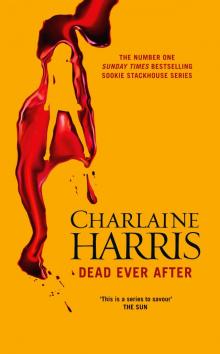 Dead Ever After
Dead Ever After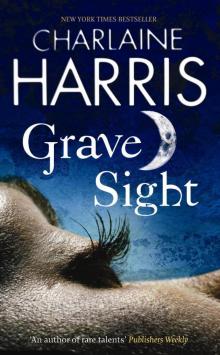 Grave Sight
Grave Sight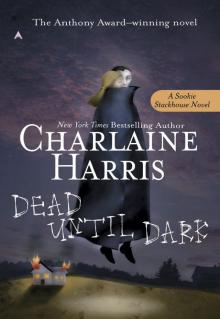 Dead Until Dark
Dead Until Dark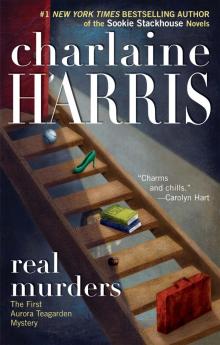 Real Murders
Real Murders Wolfsbane and Mistletoe
Wolfsbane and Mistletoe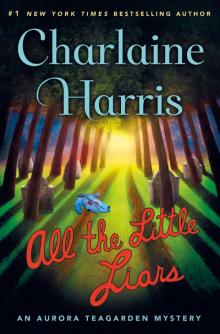 All the Little Liars
All the Little Liars Dead to the World
Dead to the World Club Dead
Club Dead Dead in the Family
Dead in the Family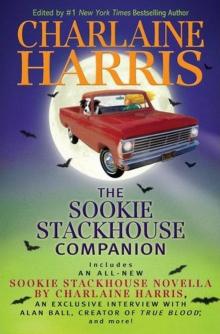 The Sookie Stackhouse Companion
The Sookie Stackhouse Companion All Together Dead
All Together Dead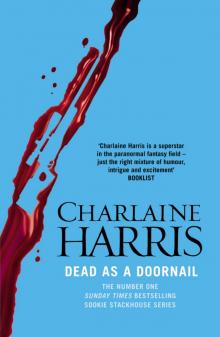 Dead as a Doornail
Dead as a Doornail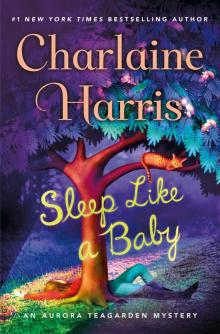 Sleep Like a Baby
Sleep Like a Baby Night Shift
Night Shift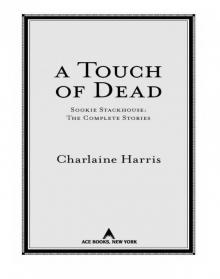 A Touch of Dead
A Touch of Dead Living Dead in Dallas
Living Dead in Dallas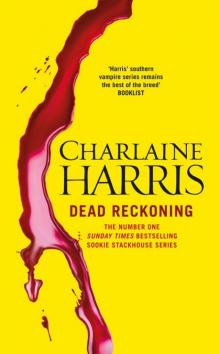 Dead Reckoning
Dead Reckoning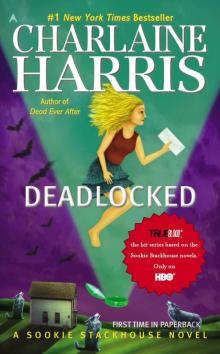 Deadlocked
Deadlocked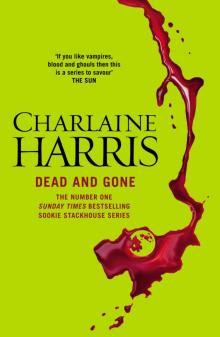 Dead and Gone
Dead and Gone From Dead to Worse
From Dead to Worse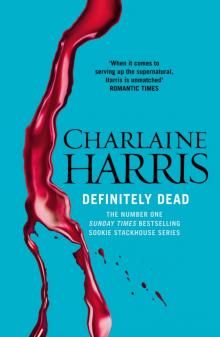 Definitely Dead
Definitely Dead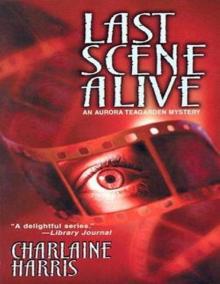 Last Scene Alive
Last Scene Alive Grave Secret
Grave Secret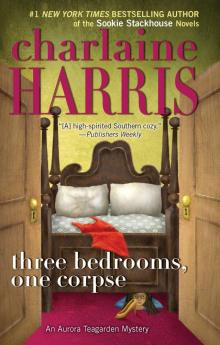 Three Bedrooms, One Corpse
Three Bedrooms, One Corpse The Russian Cage
The Russian Cage Shakespeares Counselor
Shakespeares Counselor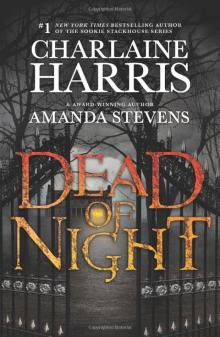 Dead of Night
Dead of Night Shakespeares Trollop
Shakespeares Trollop One Word Answer
One Word Answer Shakespeares Champion
Shakespeares Champion Shakespeares Christmas
Shakespeares Christmas Shakespeares Landlord
Shakespeares Landlord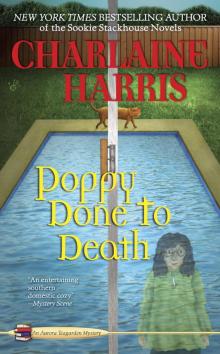 Poppy Done to Death
Poppy Done to Death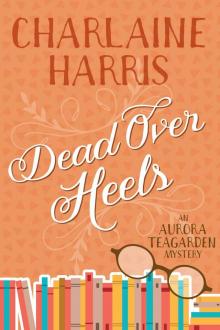 Dead Over Heels
Dead Over Heels An Ice Cold Grave
An Ice Cold Grave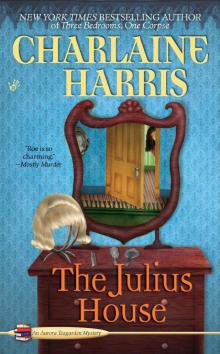 The Julius House
The Julius House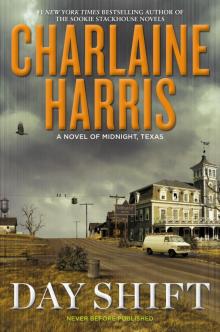 Day Shift
Day Shift A Fool And His Honey
A Fool And His Honey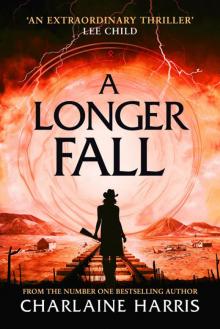 A Longer Fall (Gunnie Rose)
A Longer Fall (Gunnie Rose) The Complete Sookie Stackhouse Stories (Sookie Stackhouse/True Blood)
The Complete Sookie Stackhouse Stories (Sookie Stackhouse/True Blood)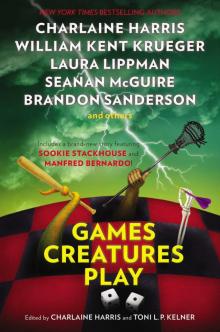 Games Creatures Play
Games Creatures Play Death's Excellent Vacation
Death's Excellent Vacation (LB2) Shakespeare's Landlord
(LB2) Shakespeare's Landlord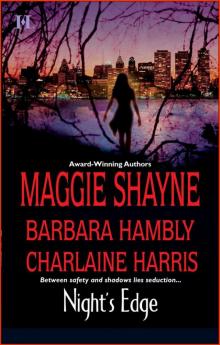 Dancers In The Dark - Night's Edge
Dancers In The Dark - Night's Edge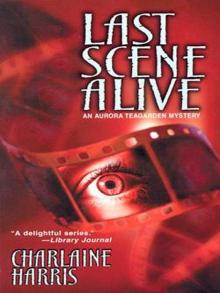 Last Scene Alive at-7
Last Scene Alive at-7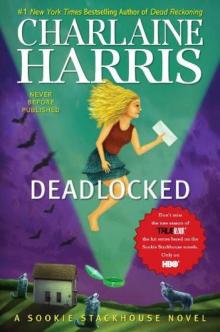 Deadlocked: A Sookie Stackhouse Novel
Deadlocked: A Sookie Stackhouse Novel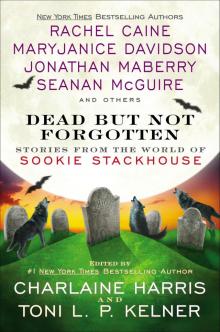 Dead But Not Forgotten
Dead But Not Forgotten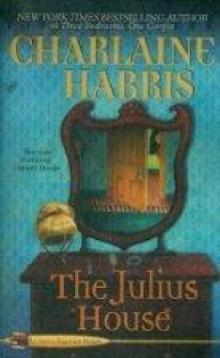 (4/10) The Julius House
(4/10) The Julius House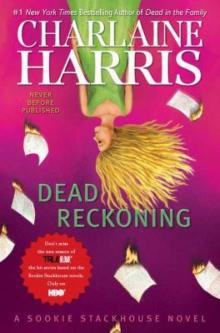 Dead Reckoning: A Sookie Stackhouse Novel
Dead Reckoning: A Sookie Stackhouse Novel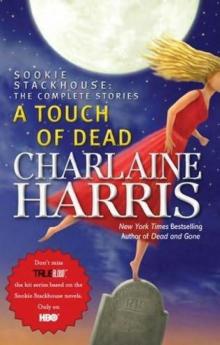 A Touch of Dead (sookie stackhouse (southern vampire))
A Touch of Dead (sookie stackhouse (southern vampire))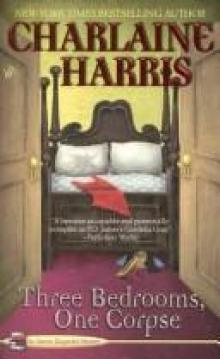 (3T)Three Bedrooms, One Corpse
(3T)Three Bedrooms, One Corpse An Easy Death
An Easy Death A Secret Rage
A Secret Rage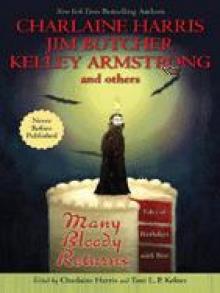 Many Bloody Returns
Many Bloody Returns![Harper Connelly [3] An Ice Cold Grave Read online](http://i1.bookreadfree.com/i/03/25/harper_connelly_3_an_ice_cold_grave_preview.jpg) Harper Connelly [3] An Ice Cold Grave
Harper Connelly [3] An Ice Cold Grave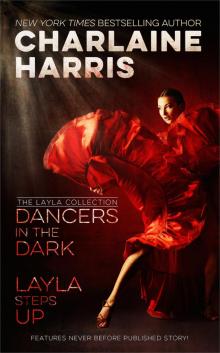 Dancers in the Dark and Layla Steps Up
Dancers in the Dark and Layla Steps Up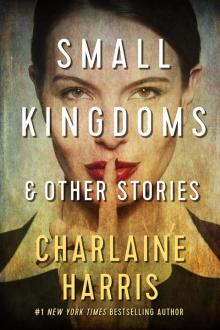 Small Kingdoms and Other Stories
Small Kingdoms and Other Stories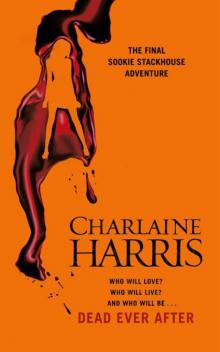 Dead Ever After: A Sookie Stackhouse Novel
Dead Ever After: A Sookie Stackhouse Novel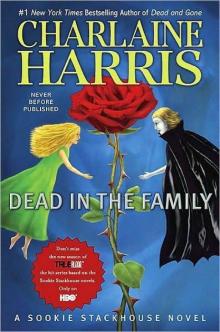 Dead in the Family ss-10
Dead in the Family ss-10 Sweet and Deadly aka Dead Dog
Sweet and Deadly aka Dead Dog An Easy Death (Gunnie Rose #1)
An Easy Death (Gunnie Rose #1) The Complete Sookie Stackhouse Stories
The Complete Sookie Stackhouse Stories Sookie Stackhouse 8-copy Boxed Set
Sookie Stackhouse 8-copy Boxed Set Sweet and Deadly
Sweet and Deadly Crimes by Moonlight
Crimes by Moonlight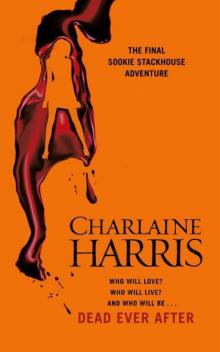 Dead Ever After: A True Blood Novel
Dead Ever After: A True Blood Novel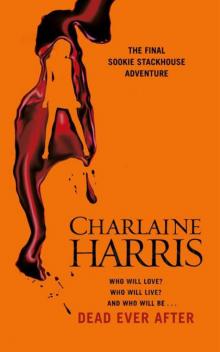 Dead Ever After ss-13
Dead Ever After ss-13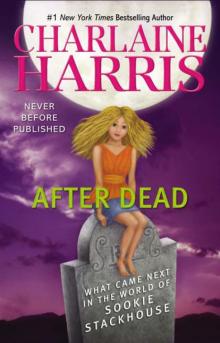 After Dead
After Dead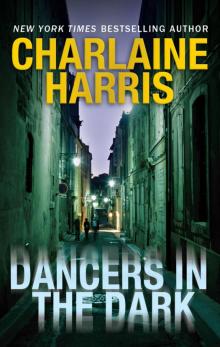 Dancers in the Dark
Dancers in the Dark (LB1) Shakespeare's Champion
(LB1) Shakespeare's Champion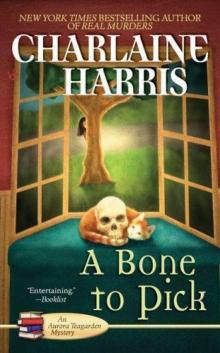 A Bone to Pick (Teagarden Mysteries,2)
A Bone to Pick (Teagarden Mysteries,2)